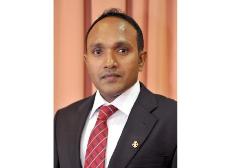The UNFPA has this week released the State of the World Population Report, along with a report focusing on the local context, titled “Reproductive Health Knowledge and Behaviour of Young Unmarried Women in the Maldives”.
The report includes recommendations calling on the state to review existing practices related to the matter within the judicial process, law enforcement, education and health sectors.
Minister of Education Aishath Shiham inaugurated the event, highlighting the state’s plans to resume awareness programs for adolescents in schools in 2014.
“The UNFPA’s Life Skills Package is the program that was most systematically and effectively run in Maldivian schools to tackle the issue of adolescent pregnancies. Over a 1000 people have been trained to be able to conduct this program. I am announcing here today that with the start of the new administrative year in 2014, the UNFPA Life Skill Package will be reintroduced,” she stated.
The minister further noted the importance of including similar concepts in teacher training courses.
Youth sexual behaviour outside marriage
The report states that while the age of marriage has been increased to 18 in the year 2000 – following which the average age of first marriage has risen to 19 in recent years – sexual and reproductive health services and commodity supplies remain available solely to married couples.
It states that while the “underlying assumption is that sexual intimacy does not or should not occur before marriage”, and while this is in accordance with societal and religious views, there is “ample evidence that this is inconsistent with the social realities of youth sexual behaviour”.
The report provides a number of studies supporting their findings, including a youth perception study conducted, in which 90 percent agreed that it is more common for “couples to initiate sexual intercourse before marriage”.
It further notes the existence of young female sex workers, citing the Biological and Behavioural Survey of 2008 which noted a prevalence of “unprotected sex with multiple partners” within the 15 – 17 age group and above.
Another cited study indicated that unsafe practices of abortion are more common among unmarried youth than their married counterparts.
“Pregnancy outside marriage is in fact, a criminal offence…Nevertheless, it has to be acknowledged that sexual activity is a consistent social reality…” the report stated, before pointing out that the issue contributes to the “public health burden of the country”, and that it stems from “a complex mix of health, social and legal consequences, primarily connected to the occurrence of pregnancy outside marriage”.
As the clearest evidence of extra-marital pregnancies, the report cites IGMH’s Family Protection Unit’s data, showing the occurrence of such pregnancies to be the third most common issue among patients it has attended to since it opened in 2006. It states that out of 41 cases recorded in an year, some have resulted from rape and sexual abuse.
“The social and legal implications connected to out of wedlock pregnancy creates an intricate link between pregnancy outside marriage and abortion. Consequently, unsafe abortion is a key issue among young Maldivian women,” it said.
Sexual and reproductive health knowledge
The report highlights that due to societal and religious taboos, sexual and reproductive health (SRH) knowledge among youth – especially unmarried youth – is alarmingly low.
The report states that information related to SRH is taught in schools within the Biology and Islam syllabuses, though not at a meaningful or significant level.
Highlighting the disparity between the number of men and women prosecuted for fornication under Sharia law, the report stated that “paternity testing is not used as admissible evidence in court and the opportunity for men to deny guilt makes male accountability something of a farce”.
The report concluded with a variety of recommendations to the health, education, judicial sectors, as well as media outlets.
In addition to encouraging various forms of awareness raising, the UNFPA called on the law enforcement sector to revise sentencing practices in which gender discrimination occurs, to review the current punitive practice of dissolving marriages if a child is born within a gestation timeframe inconsistent with the duration of marriage, and to review the non-acceptance of paternity testing in cases of extra-marital pregnancies.
Read the full report here (english).
 During the same event last night, Vice President Dr Mohamed Jameel Ahmed stated that the police’s primary objective should be to ensure that they impartially enforce law, rather than whether or not they are garnering support and popularity.
During the same event last night, Vice President Dr Mohamed Jameel Ahmed stated that the police’s primary objective should be to ensure that they impartially enforce law, rather than whether or not they are garnering support and popularity.



